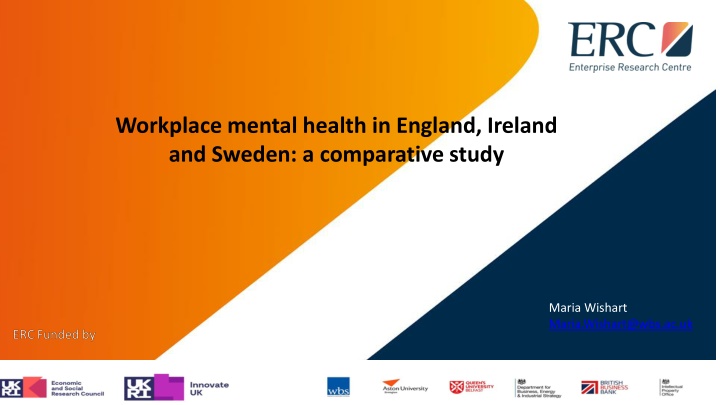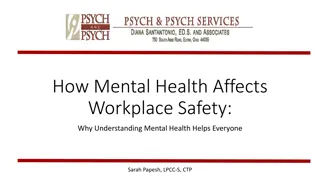Comparative Study on Workplace Mental Health in England, Ireland, and Sweden
This study compares workplace mental health in England, Ireland, and Sweden, focusing on absence impacts, presenteeism, initiatives uptake, and hybrid working. It also delves into healthcare overviews and the proportion of adults with mental disorders in these countries.
Uploaded on Feb 26, 2025 | 1 Views
Download Presentation

Please find below an Image/Link to download the presentation.
The content on the website is provided AS IS for your information and personal use only. It may not be sold, licensed, or shared on other websites without obtaining consent from the author.If you encounter any issues during the download, it is possible that the publisher has removed the file from their server.
You are allowed to download the files provided on this website for personal or commercial use, subject to the condition that they are used lawfully. All files are the property of their respective owners.
The content on the website is provided AS IS for your information and personal use only. It may not be sold, licensed, or shared on other websites without obtaining consent from the author.
E N D
Presentation Transcript
Workplace mental health in England, Ireland and Sweden: a comparative study Maria Wishart Maria.Wishart@wbs.ac.uk
Workplace mental health in England, Ireland and Sweden: a comparative study 1. Why England, Ireland and Sweden? 2. The dataset 3. Findings: Mental health absence and its impact Presenteeism Uptake of initiatives Hybrid working 4. Conclusions and implications
Healthcare overview Ireland 5,194,336 Two tier public/private healthcare system, private healthcare insurance common England 67,736,802 Sweden 10,521,556 Population Publicly funded, private care has less of a role than in UK and Ireland Publicly funded, private care available for those choosing it Healthcare funding model Free primary care for around 30% of population Primary care access Universal free access to primary care Universal free access to primary care Statutory sick pay for 5 days per year Statutory sick pay for up to 28 weeks 80% of salary for 364 days, extendable Sick pay
Proportion of adults with mental disorders 17.3% 17.7% Mental disorders 18.3% 18.5% 1.3% 1.4% Bipolar disorders and 1.4% 1.2% 2.4% 4.8% Depressive disorders 5.4% 4.7% 4.5% 5.1% Anxiety disorders 5.4% 5.9% 5.4% 3.7% Others 3.7% 3.7% 0.0% 5.0% 10.0% 15.0% 20.0% All EU United Kingdom Sweden Ireland OECD/European Union (2018)
Estimated direct and indirect costs related to mental health problems across EU countries, % of GDP OECD/European Union (2018)
Estimated direct and indirect costs related to mental health problems % of GDP Total costs Direct costs Indirect costs On health systems On social benefits On the labour market in million EUR % of GDP in million EUR % of GDP in million EUR % of GDP in million EUR % of GDP EU28 607 074 4.10% 194 139 1.31% 169 939 1.15% 242 995 1.64% Ireland 8 299 3.17% 2 232 0.85% 1 891 0.72% 4 176 1.59% Sweden 21 677 4.83% 5 696 1.27% 7 558 1.68% 8 423 1.88% UK 106 024 4.07% 36 353 1.40% 22 704 0.87% 46 967 1.80%
Data set Computer Assisted Telephone Interview (CATI) survey, for-profit and voluntary sector firms operating for at least 3 years, with minimum 10 employees Ireland: Sep-Dec 2022: 1,501 firms England: Jan-May 2023: 1,902 firms Sweden: Sep-Dec 2023: 1,000 firms Business and employee characteristics General sickness and Mental health sickness absence measurement & practices Mental health initiatives and outcomes Presenteeism Technology and high-tech working practices
Headlines Significant country-level differences in: Patterns of mental health related sickness absence Patterns and types of presenteeism Engagement in mental health & wellbeing initiatives Adoption of hybrid working Reported impact of mental health on business operations
Mental health related sickness absence Proportion of firms reporting MH sickness absence in the preceding 12 months 32% All firms 27% 17% 18% 10-19 17% 11% 31% 20-49 29% 17% 50% 50-249 46% 36% 69% 250 plus 47% 41% 0% 10% 20% 30% 40% 50% 60% 70% 80% Sweden England Ireland Sweden 1,000 firms, England 1,878 firms, Ireland 1,484 firms
Mental health related sickness absence Proportion of firms with long-term MH absence Proportion of firms with repeated MH absence Sweden Sweden 88% 40% England England 38% 47% Ireland Ireland 44% 32% 0% 20% 40% 60% 80% 100% 0% 20% 40% 60% 80% 100% Sweden 400 firms, England 471 firms, Ireland 291 firms
Mental health related sickness absence Proportion of firms reporting that MH sickness absence impacted operations Sweden 43% England 58% Ireland 46% 0% 10% 20% 30% 40% 50% 60% 70% 80% Sweden 400 firms, England 471 firms, Ireland 291 firms
Presenteeism Proportion of firms reporting presenteeism in the preceding 12 months 50% All firms 37% 27% 44% 10-19 32% 22% 46% 20-49 39% 30% 65% 50-249 46% 32% 58% 250 plus 43% 34% 0% 10% 20% 30% 40% 50% 60% 70% Sweden England Ireland Sweden 1,000 firms, England 1,902 firms, Ireland 1,501 firms
Presenteeism Type of presenteeism reported, by country Addressing presenteeism, by country 37% Sending home people who are ill 27% 19% 32% Working beyond contract 79% Reinforcing messages about life work balance 15% 9% 9% 78% 9% Investigating causes 13% 10% 61% 6% Leaders role modelling 4% 2% Working when unwell 60% 41% 4% Training for line managers 5% 3% 0% 20% 40% 60% 80% 100% 0% 10% 20% 30% 40% Sweden England Ireland Sweden England Ireland Sweden 543 firms, England 692 firms, Ireland 417 firms
Engagement in Mental Health & Wellbeing initiatives Proportion of firms disagreeing that MH is a personal issue that should not be addressed at work, by country Proportion of firms offering MH initiatives, by country & size 78% All firms 52% 46% Sweden 67% 74% 10-19 42% 36% 77% 20-49 58% 46% England 79% 82% 50-249 64% 70% 90% 250 plus 86% 85% Ireland 73% 0% 20% 40% 60% 80% 100% Sweden England Ireland 0% 20% 40% 60% 80% 100% Sweden 1,000 firms, England 1,902 firms, Ireland 1,501 firms
Engagement in Mental Health & Wellbeing initiatives Adoption of strategic/policy initiatives, by country Adoption of skills training & monitoring initiatives, by country 63% 52% Training and support for those returning to work Use data to monitor MH&W 42% 76% 22% 69% Have employee mental health champions 51% 44% 57% 21% Risk assessment/stress audits 66% 53% 46% MH budget 18% 20% 30% Training for line managers in managing mental health 62% 40% 40% MH lead at board level 45% 32% 49% Awareness raising for staff on mental health issues 39% 74% Mental health plan 32% 68% 23% 0% 20% 40% 60% 80% 0% 10% 20% 30% 40% 50% 60% 70% Sweden England Ireland Sweden England Ireland Sweden 784 firms, England 970 firms, Ireland 722 firms
Engagement in Mental Health & Wellbeing initiatives Adoption of workplace practices to reduce risk factors, by country Investments in employee wellbeing, by country Support with physical activity such as gym memberships, 95% Ensure all staff have a regular conversation about their health and wellbeing with their manager 30% 90% 50% 85% 68% 72% Access to counselling support 53% 41% Make appropriate workplace adjustments to those who need them to support their mental 84% Training aimed at building personal resilience 67% 31% 95% 30% 89% 22% Financial wellbeing advice 40% 38% Encourage open conversations about mental health in the workplace 81% 95% 40% Supplying healthy food and drinks 46% 90% 42% 0% 20% 40% 60% 80% 100% 0% 20% 40% 60% 80% 100%120% Sweden England Ireland Sweden England Ireland Sweden 784 firms, England 970 firms, Ireland 722 firms
Hybrid working Hybrid working, by country Sweden 16% 21% 63% England 11% 16% 72% Ireland 7% 25% 68% 0% 20% 40% 60% 80% 100% Yes, have always Yes, since COVID No Sweden 1,000 firms, England 1,894 firms, Ireland 1,499 firms
Hybrid working Encouraging a good work life balance for remote workers, by country Role modelling behaviour from managers 86% 72% 63% Regular informal 83% 88% conversations/reminders from line 86% Regular formal 72% 70% conversations/reminders from line 64% Company-wide communications, e.g., from HR department 67% 67% 67% Encouraging employees not to answer email outside working hours 66% 76% 74% 63% Time sheets or other tracking method 44% 54% 0% 20% 40% 60% 80% 100% Sweden England Ireland Sweden 295 firms, England 438 firms, Ireland 404 firms
Conclusions Significant differences in MH absence, presenteeism and hybrid working - role of culture and socio-political context Despite reporting higher levels of MH absence, Swedish firms significantly less likely to report impacts of MH in the workplace Swedish firm interventions more likely to be focused on strategic initiatives and investment in employees than on training and reducing risk factors
Implications? Mental health-related absence: should we be minimising or managing it? Encouraging work life balance with more embedded remote working: how should employers manage psychological detachment issues? Presenteeism: is more presenteeism an inevitable consequence of remote working, and if so, what should we do to address it? Mental health initiatives in the workplace: what should policymakers do to encourage the adoption of mental health initiatives in the workplace? Which kinds of initiatives should they encourage?
To find out more, please visit: https://www.enterpriseresearch.ac.uk/esrc-mental-health- well-being-practices-outcomes-productivity-project/























